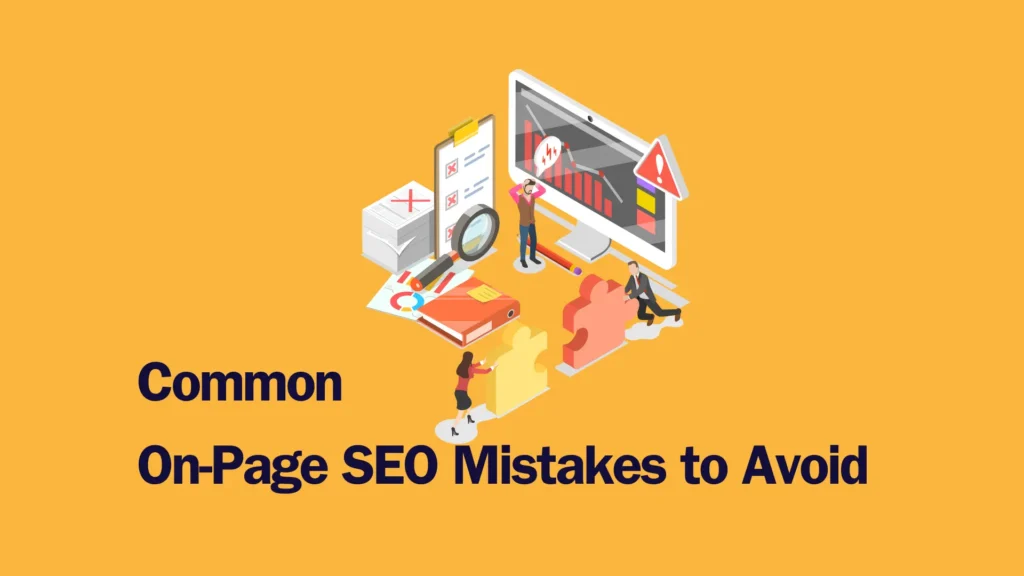
Common On-Page SEO Mistakes to Avoid
When optimizing your website for search engines, it’s easy to make errors that can hurt your performance. Whether you’re a seasoned marketer or just starting with SEO, knowing what to avoid is just as important as knowing what to implement. In this article, we’ll explore the most common on-page SEO mistakes and how avoiding them can improve your rankings, user experience, website page speed and overall online visibility.
By the end of this guide, you’ll have a clear understanding of these pitfalls and know how to sidestep them effectively. For expert SEO guidance tailored to your business, explore the services offered by Vic Ranci, a digital marketing agency specializing in comprehensive SEO solutions.
1. Neglecting Proper Keyword Research
Keyword research is the cornerstone of any successful SEO strategy. Skipping this step means you’re likely targeting the wrong search terms or, even worse, none at all. Without understanding what your audience is searching for, you could miss valuable opportunities to drive traffic to your site.
How to Avoid This: Use tools like Google Keyword Planner, Ahrefs, or SEMrush to identify high-volume, low-competition keywords relevant to your niche. Always consider search intent to ensure you’re meeting the needs of your target audience.
2. Ignoring Precise Title Tag Optimization
Your title tag is one of the first things users and search engines see. Failing to optimize it or making it too long can hurt your rankings and click-through rates (CTR). A well-crafted title tag should include your primary keyword and give users a compelling reason to click.
How to Avoid This: Keep your title tags concise—ideally between 50-60 characters—and make sure they accurately describe the content on the page. Avoid using duplicate titles across multiple pages, as this can confuse both users and search engines.
3. Writing Poorly Meta Descriptions
Many website owners overlook the importance of meta descriptions, often leaving them blank or stuffing them with keywords. A poorly written meta description can deter clicks and negatively impact your SEO performance.
How to Avoid This: Write clear, compelling meta descriptions for each page, incorporating your primary keyword naturally. Aim for around 150-160 characters and focus on enticing users to click through to your content.
4. Not Using Header Tags Properly
Header tags (H1, H2, H3) not only make your content easier to read but also help search engines understand the structure and relevance of your information. Improper use of header tags can lead to poor readability and lower SEO scores.
How to Avoid This: Use one H1 tag per page to define the primary topic, and then use H2 and H3 tags for subtopics. This hierarchy makes it easier for users to skim your content and helps search engines index your page more effectively.
5. Focusing on Quantity Over Quality
While it’s tempting to churn out content to fill up your site, focusing solely on quantity can backfire. Publishing low-quality, thin content can lead to higher bounce rates and lower search engine rankings.
How to Avoid This: Prioritize quality over quantity by producing well-researched, in-depth content that meets the needs of your audience. Quality content is more likely to be shared, linked to, and ranked higher by search engines.
6. Failing to Optimize Images
Images can significantly enhance your content, but neglecting to optimize them for SEO is a common mistake. Large, uncompressed images can slow down your site, while missing alt text can result in missed SEO opportunities.
How to Avoid This: Compress images using tools like TinyPNG or Compressor.io to reduce load times. Use descriptive filenames and include alt text that describes the image in context with your content.
Pro Tip: Vic Ranci offers comprehensive on-page optimization services to ensure all elements, including images, contribute positively to your SEO performance.
7. Overlooking Internal Links
Internal linking is crucial for SEO as it helps users and search engines navigate your site. Failing to link to other relevant content can result in poor engagement and lower rankings.
How to Avoid This: Include internal links to relevant pages within your content to encourage users to explore your site further. For example, you can link to your blog articles, service pages, or key landing pages to create a seamless navigation experience.
8. Ignoring User Experience
User experience (UX) plays a pivotal role in SEO. A cluttered, confusing, or slow-loading website can lead to high bounce rates, which signal to search engines that your site isn’t meeting user expectations.
How to Avoid This: Ensure your website is mobile-responsive, easy to navigate, and fast-loading. Tools like Google’s Page Speed Insights can help you identify areas for improvement.
9. Skipping Structured Data Markup
Structured data markup helps search engines better understand your content, increasing the chances of your page appearing in rich snippets. Ignoring structured data means missing out on valuable visibility in search results.
How to Avoid This: Implement structured data using schema markup to highlight specific content elements, such as reviews, products, or FAQs. This can improve your visibility and CTR.
10. Not Updating Content Regularly
Stale content can negatively impact your rankings. Failing to review and update your content means you’re missing out on opportunities to keep your pages relevant and competitive.
How to Avoid This: Schedule regular content audits to identify pages that need updates or improvements. Refresh outdated information, add new insights, and ensure that all links are still functional.
Final Thoughts
By avoiding these common on-page SEO mistakes, you can significantly enhance your website’s performance and user experience. For more tailored SEO strategies and support, consider partnering with Vic Ranci. Whether you need a site audit, on-page optimization, or a full-scale SEO strategy, Vic Ranci can help you navigate the complexities of SEO and achieve your business goals. Check out Vic Ranci’s free SEO consultation for personalized keyword strategies tailored to your business.
Stay Up To Date Subscribe To Our Latest SEO Guide
This website is created by Vic Ranci Digital Marketing
Copyright © Vic Ranci 2024. All Rights Reserved.

